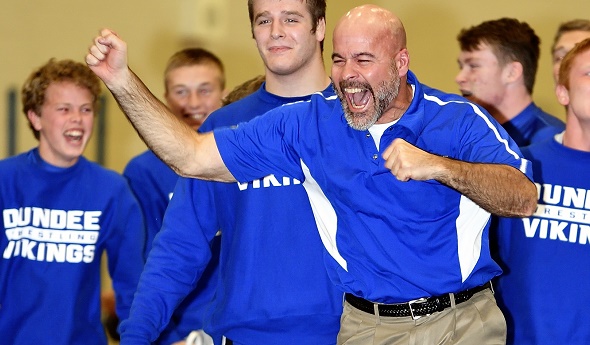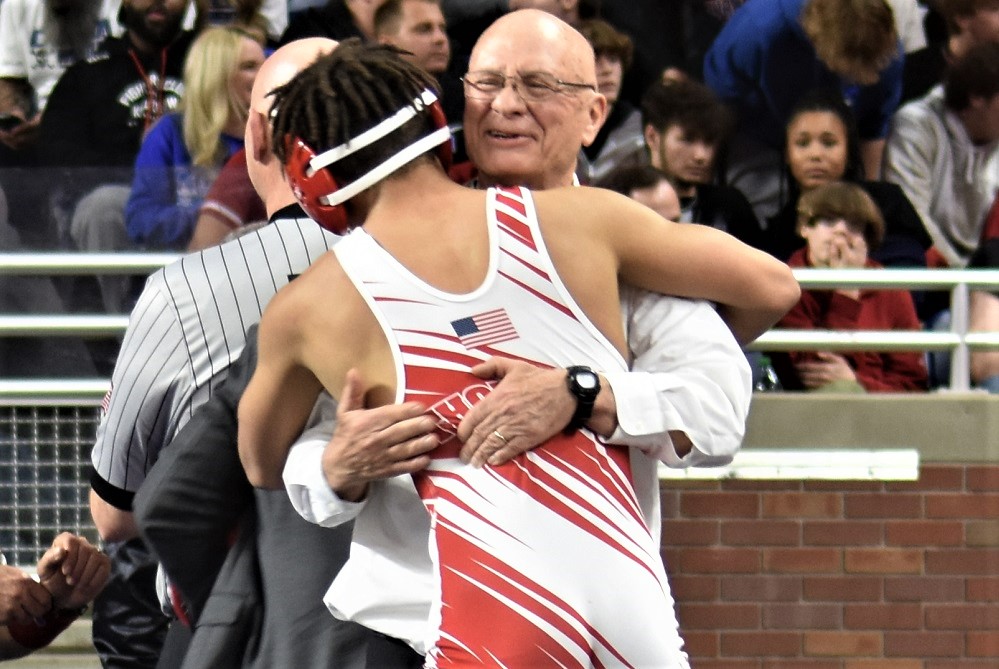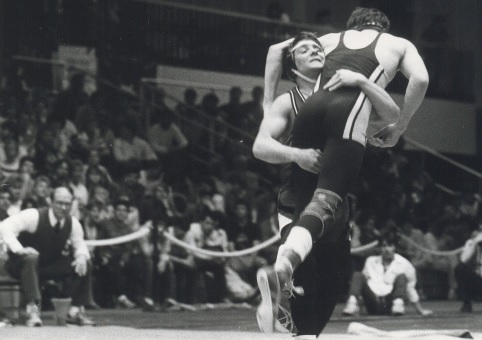
Roberts Drives Dundee to Chase Dream
January 8, 2019
By Doug Donnelly
Special for Second Half
DUNDEE – The thing that keeps Dundee wrestling coach Tim Roberts motivated isn’t another dual meet victory, matching up with state powerhouse Hudson in a conference meet or hanging another banner inside the Vikings’ gymnasium.
 Those things are nice, but what keeps Roberts going in his 20th season as the Dundee head coach is a certain two-time MHSAA Finals-qualifying wrestler from the mid-1980s who won 120 matches for Dundee but ultimately fell short of his goals.
Those things are nice, but what keeps Roberts going in his 20th season as the Dundee head coach is a certain two-time MHSAA Finals-qualifying wrestler from the mid-1980s who won 120 matches for Dundee but ultimately fell short of his goals.
That wrestler was Roberts.
“I’m always trying to prove myself, and I’m always trying to get better,” Roberts said. “When I think of myself as that kid who didn’t place at state, I do much better because I keep that hunger and desire. I need to learn more. I’ve got to get better at this.”
Roberts is already pretty good at what he does – a hall of famer, says Hudson coach Scott Marry, a seven-time MHSAA championship-winning coach himself.
“Coach Roberts is one of the best coaches I’ve ever coached against,” Marry said. “He gets his kids ready mentally and physically. You better have your team ready if you’re going to wrestle Dundee.”
Earlier this season, Roberts reached a career milestone – 500 career wins. He’s led Dundee to six Finals titles and six runner-up finishes, 19 District and 18 Regional titles. He’s coached 32 Individual Finals championship wrestlers and more than 140 all-staters. Under his leadership, Dundee also is approaching 20 Lenawee County Athletic Association titles.
The numbers don’t tell the full story about Roberts, however.
“I could write a book about Tim and how great a coach he is,” said Dundee athletic director Tom Oestrike. “His coaching profile speaks for itself, but what is even more impressive are the type of young men he has helped build in his career – men of selflessness, character and discipline.”
When Roberts wrestled at Dundee, he was a 98-pound freshman who grew to compete in the 126-pound weight class as a senior.
“We were a solid program at the time, (but) winning state was an impossible dream back then for sure,” Roberts said.
“I wasn’t bad at wrestling. I was pretty good. Compared to the guys we have now – I wasn’t as good as them. I thought I was pretty good, but I didn’t accomplish the goals that I wanted to.”
After high school, he enlisted in the Army. It was during that time that he got the coaching bug. He realized he wanted to help young student athletes learn how to get the most out of their careers.
“When I was in the military, I learned a lot about building myself into something and I wanted to share that information,” he said. “I thought about wrestling a lot and how I really didn’t accomplish the goals that I would have liked to, and I wanted to help other people. I had this desire to try to help. I felt like I had a knack for it.”
After his first year as an assistant coach, Dundee changed wrestling head coaches and Jim Wittibslager got the job. Roberts asked him if he could stay on as an assistant.
Wittibslager is a hall of fame coach in his own right. He compiled a record of 333-36-3 in two stints as the Dundee head coach. The Vikings won four straight MHSAA Finals titles during his tenure, from 1995-98.
“We went from a team 4-21 with zero state qualifiers, and by the fifth year we were state champs with 14 state qualifiers,” Roberts said. “It was quite a building process. It was lot of fun to go through and learn. Winning state went from an impossible dream to something that ‘Oh yeah, we could do this.’ We built ourselves into that level.”
Coaching with Wittibslager was a career-changer for Roberts.
“That was crucial in my development in how to coach,” he said. “I thought I had a knack for helping people and I had a little talent in that area, but I learned so much about what it takes, the work ethic and how to win and how to think like a winner.”
Admittedly, Roberts isn’t the same coach he was two decades ago. The sport has evolved significantly.
“I don’t coach now like I did 20 years ago, I’ll say that,” he said. “You grow with the times or you get left behind.”
What hasn’t changed during that time is Roberts’ attention to detail, his passion for coaching the right technique and getting his team ready for meets. Practices now include time in the weight room, warming up with some gymnastics moves such as back handstands, leaps and cartwheels; and, of course, technique.
“We still do conditioning,” he said. “We do quite a bit of that.”
Roberts believes one thing that sets wrestlers apart from each other is how far they can push themselves on the mat – when they reach the point where they feel they don’t have any more strength or ability, they find it.
“The only way you know if you can (push yourself) is by getting (to that point). That, as much as anything, will win you matches,” he said.
Maintaining that success has never been easy. Dundee typically has about 20 wrestlers out each year, a comparably low number to some other high-level programs. But that is where Roberts does his best work. Coaching at the high school level, he said, isn’t about coaching extraordinary athletes – it’s about coaching the average ones.
“It’s been an endless process for 20 years to keep trying to get better at this,” he said. “Average people are who you are coaching. That’s what coaching high school is, I think, learning how to work with the average person. Then, once in a while, you get to work with the exceptional person and that’s fun.”
Despite the enormous success during his 20 seasons at Dundee, Roberts has experienced the same highs and lows as any other coach.
“Lots of highs and lows,” he said. “Lots of times of feeling great, then you get humbled. Then you start feeling great again and then humbled again.”
Roberts coached Dundee to a Division 4 championship in 2001 and Division 3 titles in 2007, 2013, 2014, 2016 and 2018. Last year’s team was ranked nationally and had 14 Individual Finals qualifiers.
“Every one of those (championships) is like the best day of my life,” Roberts said. “Every time. It’s such a great feeling in the end that it all came together, and everything did work, and you did get it all done. A lot of things have to go right. It’s not easy.”
Roberts, 50, isn’t planning on stepping away from coaching any time soon. He’s also not stopping to think about reaching 500 career wins any time soon. He’d rather think about that high school wrestler who missed out on winning a state championship – but has had a remarkable impact on so many others.
“That’s for when you are done (coaching),” he said. “Right now, I’m still trying to get better and trying to work on my weaknesses as a coach and always seeking out how I can be better at this. When you’re done is when you get to reflect.”
 Doug Donnelly has served as a sports and news reporter and city editor over 25 years, writing for the Daily Chief-Union in Upper Sandusky, Ohio from 1992-1995, the Monroe Evening News from 1995-2012 and the Adrian Daily Telegram since 2013. He's also written a book on high school basketball in Monroe County and compiles record books for various schools in southeast Michigan. E-mail him at [email protected] with story ideas for Jackson, Washtenaw, Hillsdale, Lenawee and Monroe counties.
Doug Donnelly has served as a sports and news reporter and city editor over 25 years, writing for the Daily Chief-Union in Upper Sandusky, Ohio from 1992-1995, the Monroe Evening News from 1995-2012 and the Adrian Daily Telegram since 2013. He's also written a book on high school basketball in Monroe County and compiles record books for various schools in southeast Michigan. E-mail him at [email protected] with story ideas for Jackson, Washtenaw, Hillsdale, Lenawee and Monroe counties.
PHOTO: Dundee wrestling coach Tim Roberts and his team celebrate one of the many successful moments during his two decades leading the program. (Photo by David Schankin.)

Winningest Coach Moving on from Matside, but Leaving Lasting Lakeshore Impact
By
Wes Morgan
Special for MHSAA.com
April 11, 2022
Bruce Bittenbender’s impact on the sport of wrestling in Michigan is immeasurable.
 And the fact that he’ll no longer occupy a chair next to the mats at Stevensville Lakeshore High School is almost unfathomable after a legendary 52-year career there.
And the fact that he’ll no longer occupy a chair next to the mats at Stevensville Lakeshore High School is almost unfathomable after a legendary 52-year career there.
His list of accomplishments over that span is staggering, though the incalculable number of lives he touched — a realization that came from the outpouring of messages from his former student-athletes following his retirement announcement in late March — is what Bittenbender believes is the most important part of his legacy.
“It is absolutely heartwarming,” Bittenbender said at his retirement press conference April 1. “In many cases (some students) are on the edge. I had a guy say to me yesterday, ‘Coach, I didn’t have a father. I want to thank you.’
“How many state titles is that worth? There is a lot of that I appreciate.”
What can be quantified are the competition results during his tenure.
Bittenbender leaves with a dual meet record of 981-270-2 — the most victories in state history and the second most in the country. The program claimed 28 District titles, 13 Regional championships and 33 conference titles. The Lancers were undefeated in duals four times (1976, 1978, 1984 and 1986) and finished as MHSAA Finals runners-up twice (1986 and 1994).
“There are no shortcuts to being successful,” Lakeshore athletic director Greg Younger said. “Coach is always here. He’s probably here more than most teachers (although he retired in 2010). He is in the building early and often. He’s scrubbing the mats. I know it doesn’t magically happen. He’s always here preparing for a match and doing something here, talking to kids in the halls and building those relationships.
“He’s been a testament to hard work and what it takes to really have a goal all the time. When he steps into the wrestling room he’s always prepared, he’s always planning for tomorrow and he’s always planned for what’s coming up next. Nothing has ever surprised him.”
 There were a total of 26 Individual Finals champions and 116 state placers under his watch, with Micah Hanau (also a winner in 2020), Zamuel Thompson and Aaron Lucio the most recent to have stood atop the podium and celebrate championships with Bittenbender last month at Ford Field.
There were a total of 26 Individual Finals champions and 116 state placers under his watch, with Micah Hanau (also a winner in 2020), Zamuel Thompson and Aaron Lucio the most recent to have stood atop the podium and celebrate championships with Bittenbender last month at Ford Field.
Shane Williams (2020), Riley Bettich (2018), Tyler Humes (2010), Tyler Daniel (2009), Ryan Huebner (2002), John King (1992), Scott Mabrey (1992), Mark McKie (1992, 1991), Jason Cluff (1988, 1987, 1986), Dave Strejc (1988), Matt Cluff (1987, 1986, 1985), John Spear (1986), Gary Smith (1981, 1980) John Murphy (1979), Doug Smith (1978), and Rick McGrath (1974) all were guided to the state’s top individual level by Bittenbender.
For his accomplishments, Bittenbender was named Regional Coach of the Year 11 times, Michigan Wrestling Coach of the Year by the Coaches Association (2002) and National Coach of the Year twice, by the National Federation of State High School Associations (2002) and National High School Athletic Coaches Association (2010). His rightful spot in the Michigan Wrestling Coaches Association Hall of Fame was claimed in 2010, and he was inducted into the National Coaches Association Hall of Fame the following year. In 2012, his home state honored Bittenbender with an induction into the Pennsylvania Wrestling Hall of Fame, and Milligan University (Tenn.), where he wrestled four years, did the same in 2019.
“We went through three years of pulling teeth and hard work,” said Bittenbender, who took over at struggling Lakeshore in 1970. “Finally, we hit pay dirt. We got a kid to be state champion (in 1974), Ricky McGrath. This guy opened it up. After that, kids wanted to be Lakeshore wrestlers.”
But there were thousands of others that also laid bricks over the years to help build the program up to where it is today.
“There were a lot of kids that weren’t state champions here; there were a lot of kids that weren’t District champions or Regional champions or even conference champions,” Bittenbender said. “But they were here everyday, they were working everyday, they were part of this program and you’ve got to give those kids credit.”
Ryan Quinn takes over the program after serving as assistant coach.
“I’m incredibly blessed, grateful and humbled to be part of this school, to be taking over the reins of such a successful wrestling program,” Quinn said. “It is truly an honor to succeed Coach Bittenbender. He has made such a lasting impression on my life in such a short period of time. I know with confidence he has made lasting impacts on all who are involved in his as well. His fingerprints will forever remain on this school district and wrestling program.”
Bittenbender thanked his family, all the parents, volunteers and sponsors that supported the program over the last 52 years.
“It was a great place to live; it was a great place to coach. I’m lucky. It is a great community, my kids got a great education here, and it has been great to see kids go on to be good fathers and go to work every day,” he said.
“I want to thank my family over the years. If you’re going to be a wrestling coach’s wife, you’ve got to be something special. We’re going to spend a lot more time together.”
When Bittenbender was named 2010 National Coach of the Year, Nebraska’s Tom Osborne was the keynote speaker. Bittenbender recalled him saying: ‘If you want to know if you’re a good man, write down the 10 things you want the guy to say in your obituary. If he says eight of them, you’re a good man.”
“I hope I’m a good man,” Bittenbender said.
 Wes Morgan has reported for the Kalamazoo Gazette, ESPN and ESPNChicago.com, 247Sports and Blue & Gold Illustrated over the last 12 years and is the publisher of JoeInsider.com. He can be reached at [email protected] with story ideas for Berrien, Cass, St. Joseph and Branch counties.
Wes Morgan has reported for the Kalamazoo Gazette, ESPN and ESPNChicago.com, 247Sports and Blue & Gold Illustrated over the last 12 years and is the publisher of JoeInsider.com. He can be reached at [email protected] with story ideas for Berrien, Cass, St. Joseph and Branch counties.
PHOTOS (Top) Retiring Stevensville Lakeshore wrestling coach Bruce Bittenbender, right, embraces Zamuel Thompson after Thompson’s Individual Finals championship win last month at Ford Field. (Middle) Lakeshore’s Matt Cluff lifts Eaton Rapids’ Scott Bolin during their 1986 Class B championship match. (Top photo by HighSchoolSportsScene.com, middle photo courtesy of the St. Joseph Herald-Palladium.)

